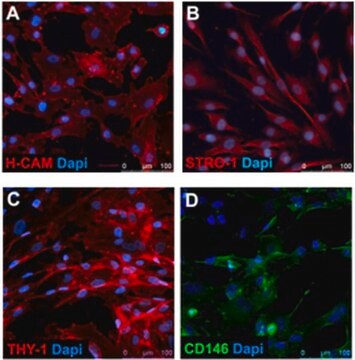SCC034
Human Mesenchymal Stem Cells (Bone Marrow)
Human mesenchymal stem cells derived from bone marrow that have a capacity for expansion in vitro while maintaining their potential for differentiation to multiple lineages including adipocytes, osteoblasts and chondrocytes.
Synonym(s):
Human Bone Marrow MSCs, Human Bone Marrow Multipotent Stem Cells, Human MSCs
About This Item
Recommended Products
biological source
human
Quality Level
technique(s)
cell culture | mammalian: suitable
cell culture | stem cell: suitable
cell differentiation: suitable
input
sample type mesenchymal stem cell(s)
shipped in
liquid nitrogen
General description
EMD Millipore’s Human Mesenchymal Stem Cells (Bone Marrow) are isolated from normal human bone marrow and are cryopreserved at P2 to ensure optimal phenotype and the highest viability and plating efficiency. These cells proliferate as an adherent cell monolayer and have shown a strong capacity for expansion in vitro while maintaining their potential for differentiation to multiple lineages including adipocytes, osteoblasts and chondrocytes..
Cell Line Description
Application
Stem Cell Research
Components
Quality
- Cell viability is greater than 75% at thaw and cells can be cultured for at least 3 population doublings after the initial thaw.
- Bone marrow donors tested negative for HIV, hepatitis B and hepatitis C.
- Apparently normal karyotype per cytogenetic analysis.
- Cells tested negative for mycoplasma contamination.
Storage and Stability
Disclaimer
Storage Class Code
10 - Combustible liquids
WGK
WGK 3
Flash Point(F)
Not applicable
Flash Point(C)
Not applicable
Certificates of Analysis (COA)
Search for Certificates of Analysis (COA) by entering the products Lot/Batch Number. Lot and Batch Numbers can be found on a product’s label following the words ‘Lot’ or ‘Batch’.
Already Own This Product?
Find documentation for the products that you have recently purchased in the Document Library.
Customers Also Viewed
Articles
Highly characterized human mesenchymal stem cell lines from bone-marrow, adipose and umbilical cord along with serum-free MSC expansion and differentiation media.
Read types of stem cells including multipotent stem cells, Pluripotent stem cells and iPSCs and their applications in basic stem cell research, stem cell therapy and disease modelling
Development of a novel serum-free and xeno-free human mesenchymal stem cell (MSC) osteocyte differentiation media.
PLTMax® Human Platelet Lysate (hPL) is a superior serum-free and xeno-free media supplement alternative to fetal bovine serum (FBS) for human mesenchymal stem cell (MSC) cultures.
Protocols
Information about mesenchyme, specifically mesenchymal stem cell procotols. Step-by-step cell culture protocols for mesenchymal stem cell (MSC) isolation, expansion and differentiation.
Our team of scientists has experience in all areas of research including Life Science, Material Science, Chemical Synthesis, Chromatography, Analytical and many others.
Contact Technical Service









